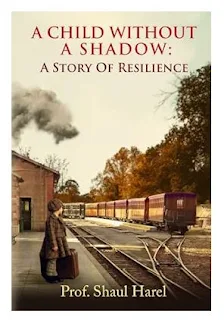A Child Without a Shadow: A Story of Resilience
The story is a memoir of the life of Shaul
Harel. He was a Jewish boy named Charlie Hilsberg. As a child in 1930s Belgium he enjoyed a brief early experience with a loving and closely knit
family until the Nazi invasion robbed him of his parents and an older brother
and robbed them of their lives. Shaul survived. The shadow he lost was his
early identity along with early memories of what happened in those early years
as he was moved from home to home by caring Belgians who risked their lives to
save so many Jewish children. Following the war, we learn of a different kind
of survival. Shaul goes to Israel where he gets an education but adapting to
the new culture is not easy.
We learn of his fierce
loyalty to his new country and strong desire to become a physician. His drive
to survive appears to motivate him to overcome barriers in his chosen field of
paediatric neurology as well as barriers to medical treatment for his young
patients.
The story is compelling.
One thing is missing. As a psychologist who has evaluated many children who
have survived abuse and neglect, Shaul does not consider the role of
intelligence. I agree with him about the power of resilience and the importance
of the early nurturance he received before all hell broke loose. However,
Shaul is an exceptional man who became a leader in his medical field as a
clinician and medical researcher. People with high intelligence have a higher
capacity to learn from, adapt to, and solve problems more than others. It is
not any child who can learn multiple languages, gain entry into medical school,
and pass challenging exams.
The only downside to the
book is the grammatical errors and structure that interferes with a smooth
read. I hope that an editor will be involved in a new edition.
I read a Kindle edition of A Child Without a Shadow: A Story of Resilience.
Geoffrey W. Sutton, PhD is Emeritus Professor of Psychology. He retired from a clinical practice and was credentialed in clinical neuropsychology and psychopharmacology. His website is www.suttong.com
See Geoffrey Sutton’s books on AMAZON or GOOGLE STORE
Follow on FACEBOOK Geoff W. Sutton
TWITTER @Geoff.W.Sutton
You can read many published articles at no charge:
Academia Geoff W Sutton ResearchGate Geoffrey W Sutton

Comments
Post a Comment